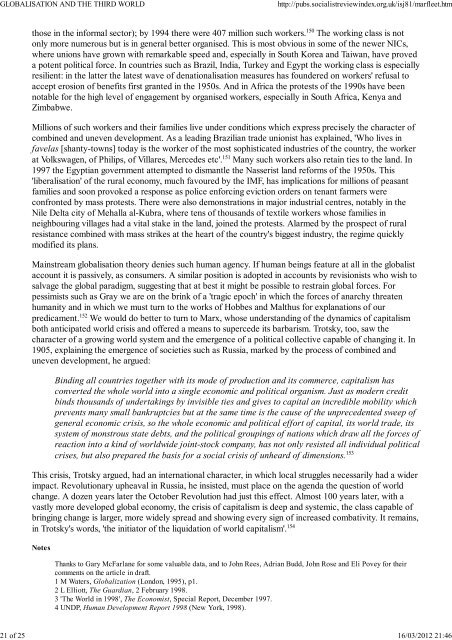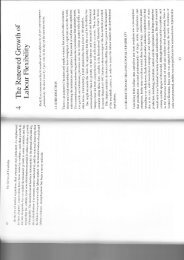GLOBALISATION AND THE THIRD WORLD.pdf - Steerweb.org
GLOBALISATION AND THE THIRD WORLD.pdf - Steerweb.org
GLOBALISATION AND THE THIRD WORLD.pdf - Steerweb.org
You also want an ePaper? Increase the reach of your titles
YUMPU automatically turns print PDFs into web optimized ePapers that Google loves.
<strong>GLOBALISATION</strong> <strong>AND</strong> <strong>THE</strong> <strong>THIRD</strong> <strong>WORLD</strong>http://pubs.socialistreviewindex.<strong>org</strong>.uk/isj81/marfleet.htm21 of 25 16/03/2012 21:46those in the informal sector); by 1994 there were 407 million such workers. 150 The working class is notonly more numerous but is in general better <strong>org</strong>anised. This is most obvious in some of the newer NICs,where unions have grown with remarkable speed and, especially in South Korea and Taiwan, have proveda potent political force. In countries such as Brazil, India, Turkey and Egypt the working class is especiallyresilient: in the latter the latest wave of denationalisation measures has foundered on workers' refusal toaccept erosion of benefits first granted in the 1950s. And in Africa the protests of the 1990s have beennotable for the high level of engagement by <strong>org</strong>anised workers, especially in South Africa, Kenya andZimbabwe.Millions of such workers and their families live under conditions which express precisely the character ofcombined and uneven development. As a leading Brazilian trade unionist has explained, 'Who lives infavelas [shanty-towns] today is the worker of the most sophisticated industries of the country, the workerat Volkswagen, of Philips, of Villares, Mercedes etc'. 151 Many such workers also retain ties to the land. In1997 the Egyptian government attempted to dismantle the Nasserist land reforms of the 1950s. This'liberalisation' of the rural economy, much favoured by the IMF, has implications for millions of peasantfamilies and soon provoked a response as police enforcing eviction orders on tenant farmers wereconfronted by mass protests. There were also demonstrations in major industrial centres, notably in theNile Delta city of Mehalla al-Kubra, where tens of thousands of textile workers whose families inneighbouring villages had a vital stake in the land, joined the protests. Alarmed by the prospect of ruralresistance combined with mass strikes at the heart of the country's biggest industry, the regime quicklymodified its plans.Mainstream globalisation theory denies such human agency. If human beings feature at all in the globalistaccount it is passively, as consumers. A similar position is adopted in accounts by revisionists who wish tosalvage the global paradigm, suggesting that at best it might be possible to restrain global forces. Forpessimists such as Gray we are on the brink of a 'tragic epoch' in which the forces of anarchy threatenhumanity and in which we must turn to the works of Hobbes and Malthus for explanations of ourpredicament. 152 We would do better to turn to Marx, whose understanding of the dynamics of capitalismboth anticipated world crisis and offered a means to supercede its barbarism. Trotsky, too, saw thecharacter of a growing world system and the emergence of a political collective capable of changing it. In1905, explaining the emergence of societies such as Russia, marked by the process of combined anduneven development, he argued:Binding all countries together with its mode of production and its commerce, capitalism hasconverted the whole world into a single economic and political <strong>org</strong>anism. Just as modern creditbinds thousands of undertakings by invisible ties and gives to capital an incredible mobility whichprevents many small bankruptcies but at the same time is the cause of the unprecedented sweep ofgeneral economic crisis, so the whole economic and political effort of capital, its world trade, itssystem of monstrous state debts, and the political groupings of nations which draw all the forces ofreaction into a kind of worldwide joint-stock company, has not only resisted all individual politicalcrises, but also prepared the basis for a social crisis of unheard of dimensions. 153This crisis, Trotsky argued, had an international character, in which local struggles necessarily had a widerimpact. Revolutionary upheaval in Russia, he insisted, must place on the agenda the question of worldchange. A dozen years later the October Revolution had just this effect. Almost 100 years later, with avastly more developed global economy, the crisis of capitalism is deep and systemic, the class capable ofbringing change is larger, more widely spread and showing every sign of increased combativity. It remains,in Trotsky's words, 'the initiator of the liquidation of world capitalism'. 154NotesThanks to Gary McFarlane for some valuable data, and to John Rees, Adrian Budd, John Rose and Eli Povey for theircomments on the article in draft.1 M Waters, Globalization (London, 1995), p1.2 L Elliott, The Guardian, 2 February 1998.3 'The World in 1998', The Economist, Special Report, December 1997.4 UNDP, Human Development Report 1998 (New York, 1998).




